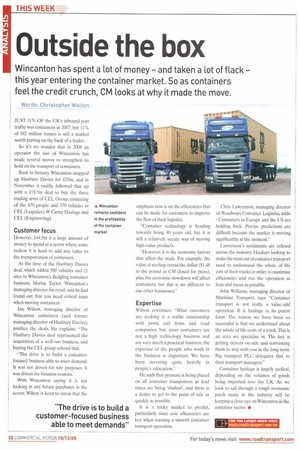Outside the box
Page 20

If you've noticed an error in this article please click here to report it so we can fix it.
Wincanton has spent a lot of money and taken a lot of flack this year entering the container market. So as containers feel the credit crunch, CM looks at why it made the move.
Words: Christopher Watton JUST 11% OF the UK's inbound port traffic was containers in 2007, but 11% of 582 million tonnes is still a market worth putting on the back of a trailer.
So it's no wonder that in 2008 an operator the size of Wincanton has made several moves to strengthen its hold on the transport of containers.
Back in January, Wincanton snapped up Hanbury Davies for £25m, and in November it swiftly followed that up with a £19.5m deal to buy the three trading arms of CEL Group, consisting of the 470 people and 370 vehicles in CEL (Logistics), W Carter Haulage and CEL (Engineering).
Customer focus However, £44.5m is a large amount of money to spend in a sector where some reckon it is hard to add any value to the transportation of containers.
At the time of the Hanhury Davies deal, which added 500 vehicles and 21 sites to Wincanton's fledgling container business, Martin Taylor, Wincanton's managing director for retail, said he had found out that you need critical mass when moving containers.
Ian Wilson, managing director of Wincanton containers (and former managing director of Hanbury Davies), justifies the deals. He explains: "The Hanbury Davies deal represented the acquisition of a well-run business, and buying the CEL group echoed that.
"The drive is to build a customerfocused business able to meet demand. It was not driven for size purposes. It was driven for business reasons.
With Wincanton saying it is not looking at any future purchases in the sector, Wilson is keen to stress that the emphasis now is on the efficiencies that can be made for customers to improve the flow of their logistics.
"Container technology is heading towards being 40 years old, but it is still a relatively secure way of moving high-value products.
"However, it is the economic factors that affect the trade. For example, the value of sterling versus the dollar ($1.48 to the pound as CM closed for press), plus, the economic slowdown will affect containers, but this is no different to our other businesses."
Expertise Wilson continues: "What customers are seeking is a stable relationship with ports, rail firms and road companies, but, since containers are not a high technology business and are very much a practical business, the expertise of the people who work in the business is important. We have been investing quite heavily in people's education."
He adds that pressure is being placed on all container transporters as lead times are being 'slashed', and there is a desire to get to the point of sale as quickly as possible.
It is a tricky market to predict, particularly since cost efficiencies are key when running a smooth container transport operation. Chris Lawrenson, managing director of Roadways Container Logistics, adds: "Consumers in Europe and the US are holding back. Precise predictions are difficult because the market is moving significantly at the moment."
Lawrenson's sentiments arc echoed across the industry. Hauliers looking to make the most out of container transport need to understand the whole of life cost of their trucks in order to maximise efficiencies and run the operation as lean and mean as possible.
John Williams, managing director of Maritime Transport, says: "Container transport is not really a value-add operation. It is haulage in its purest form. The reason we have been so successful is that we understand about the whole of life costs of a truck. This is an area we specialise in. The key is getting drivers on-side and convincing them to stay with you in the long term. Big transport PLC delegates that to their transport managers."
Container haulage is largely cyclical, depending on the volumes of goods being imported into the UK. As we look to sail through a rough economic patch many in the industry will be keeping a close eye on Wincanton in the container sector. •




































































































































































